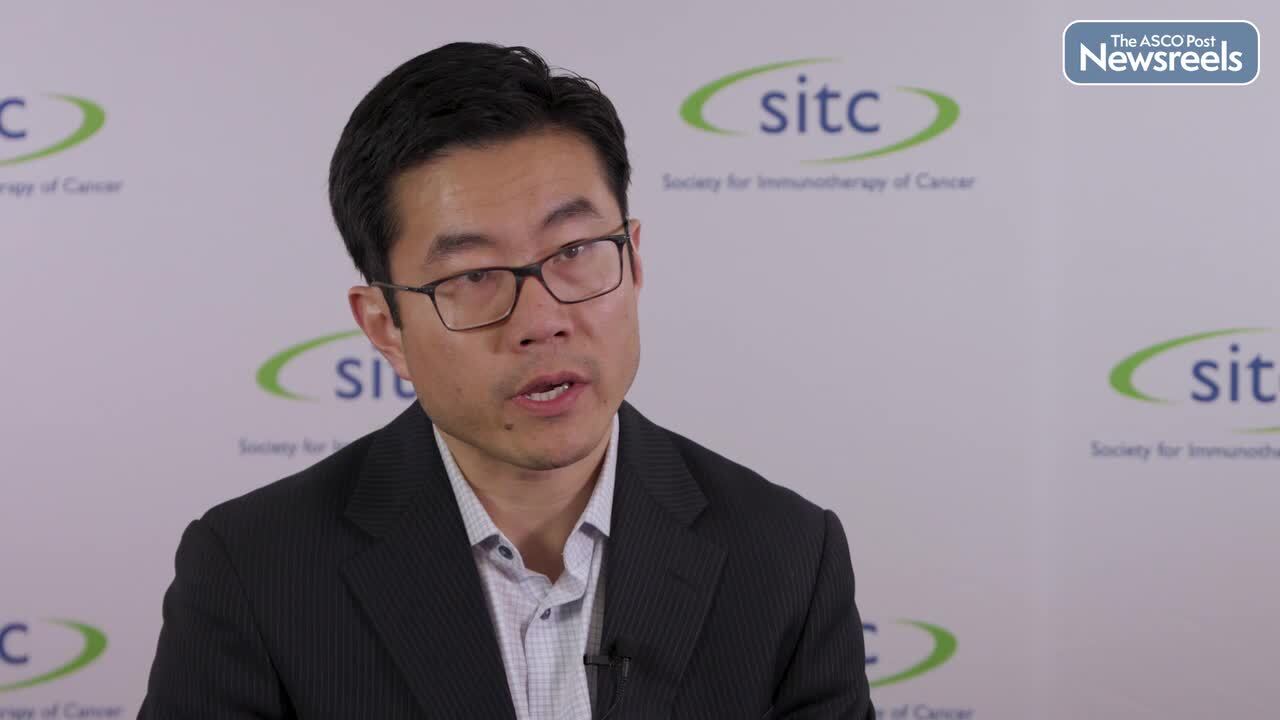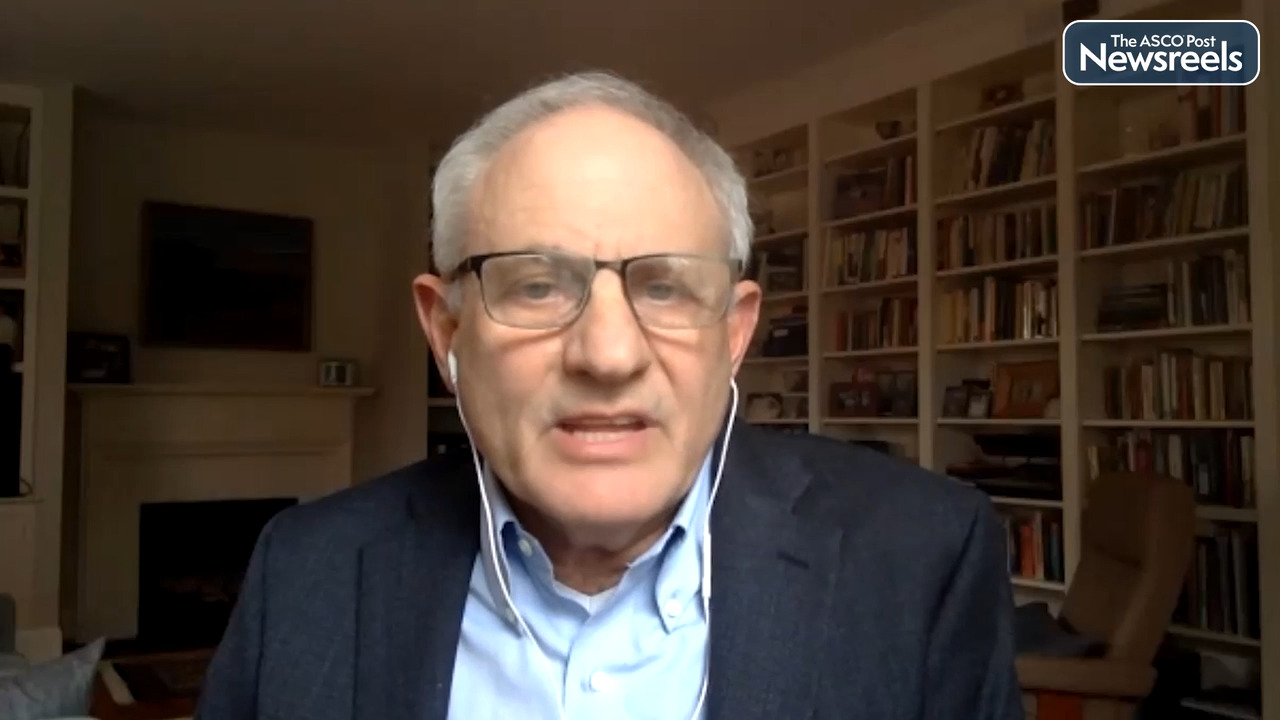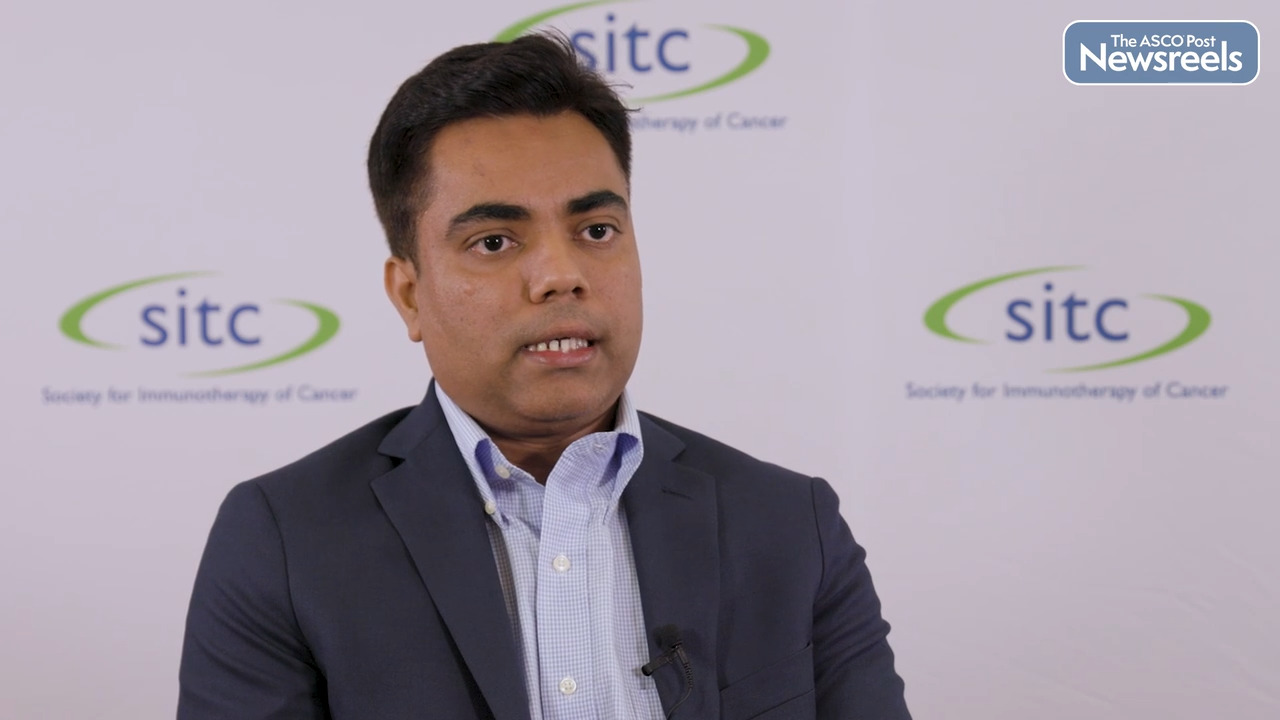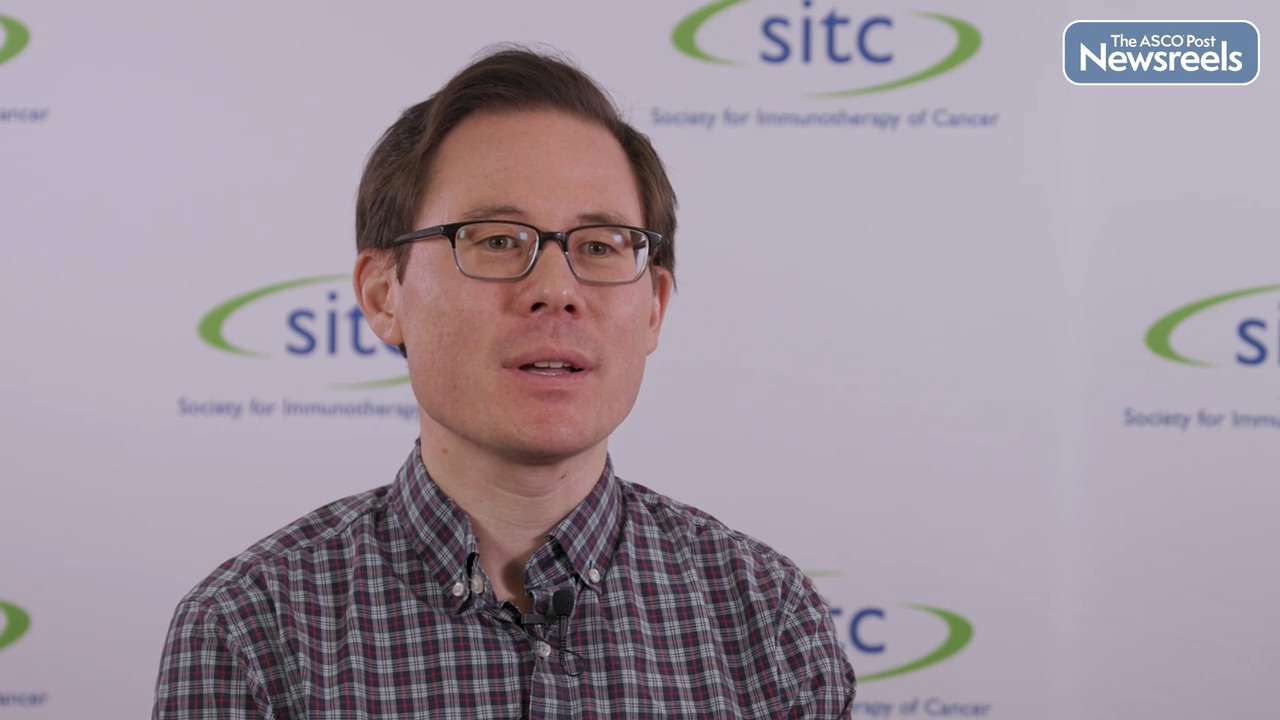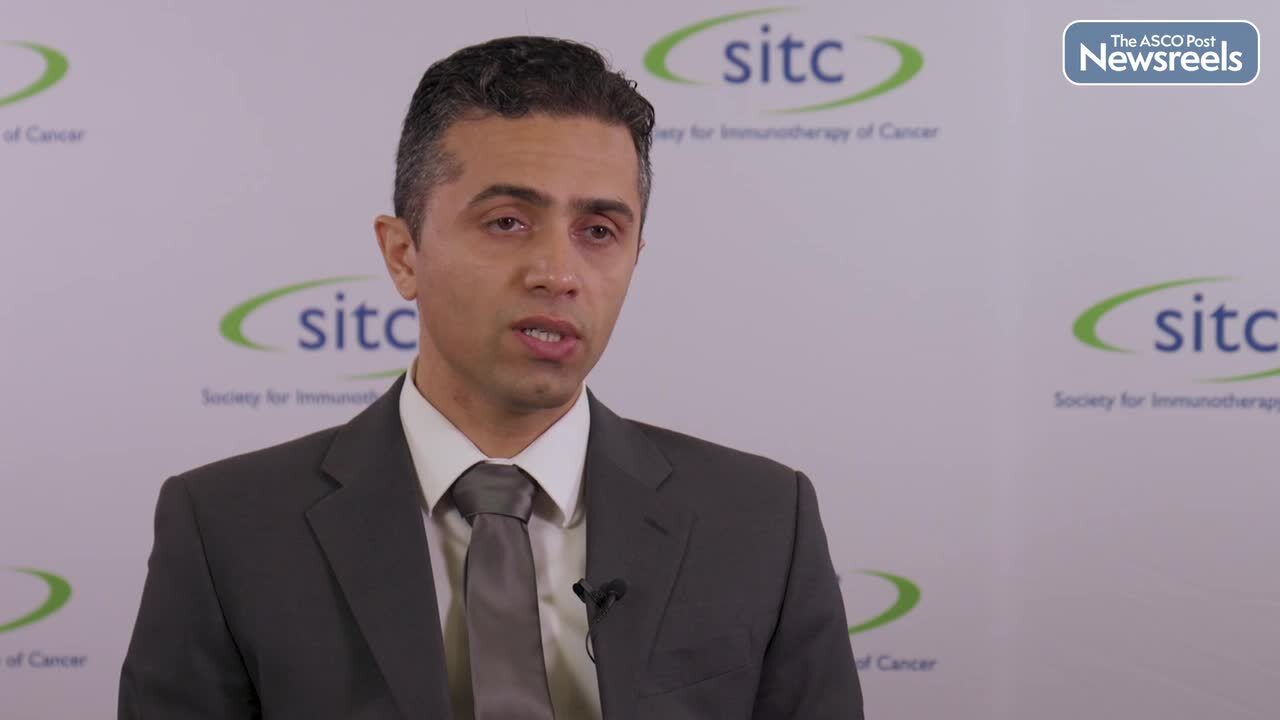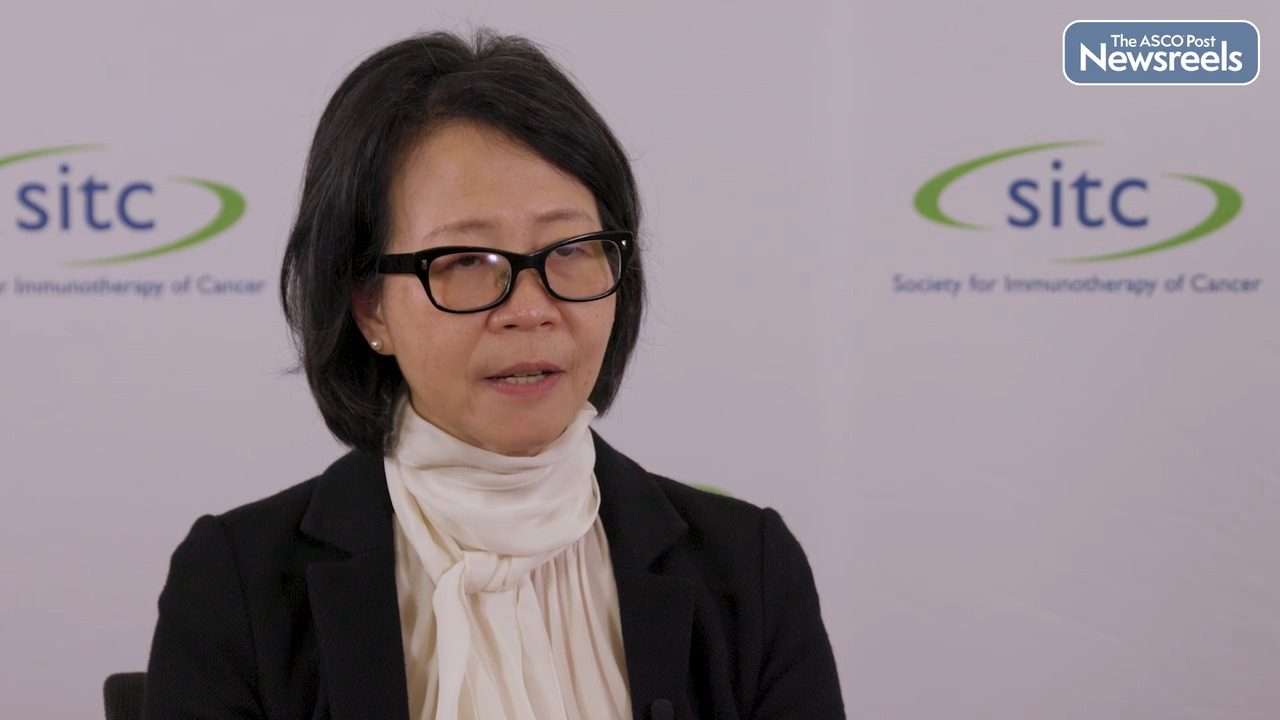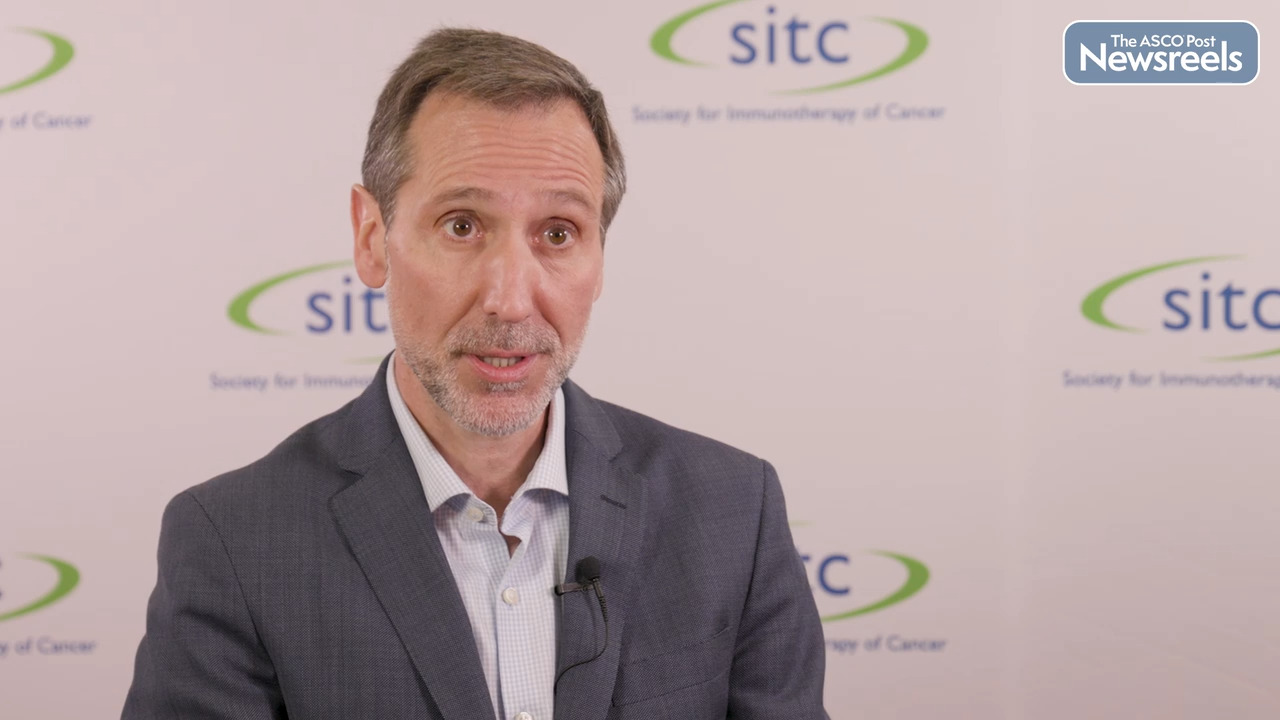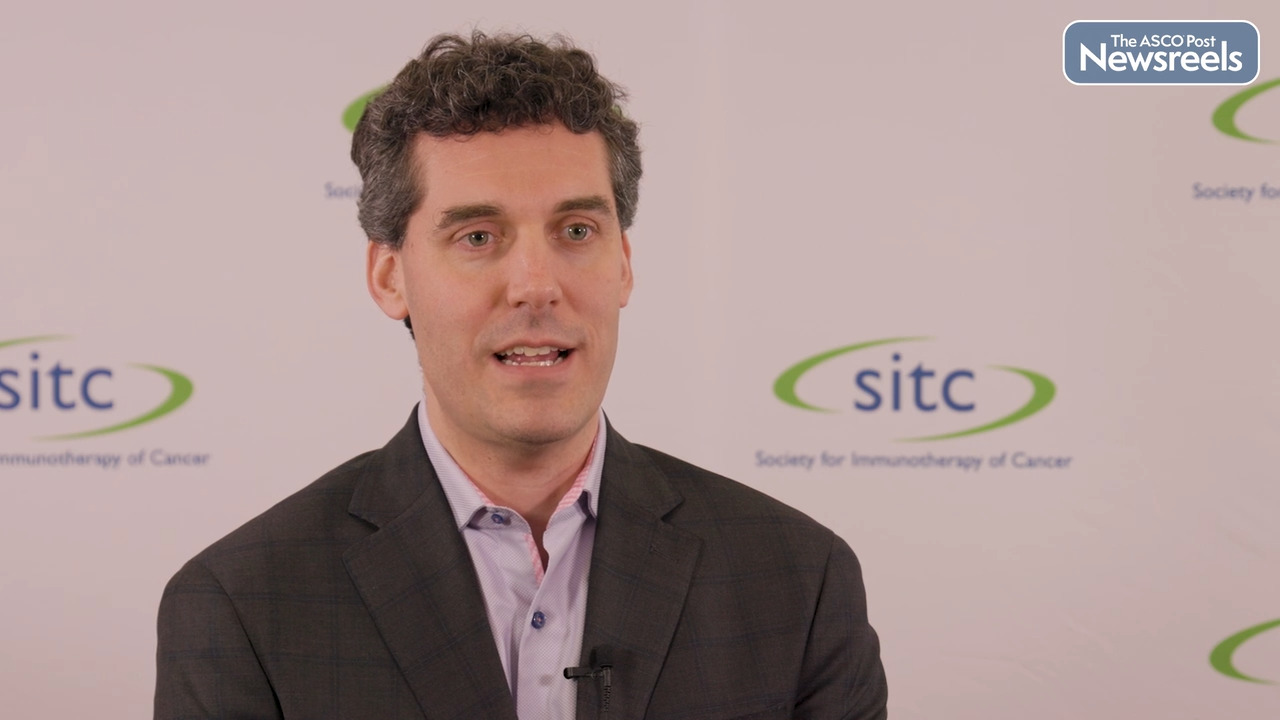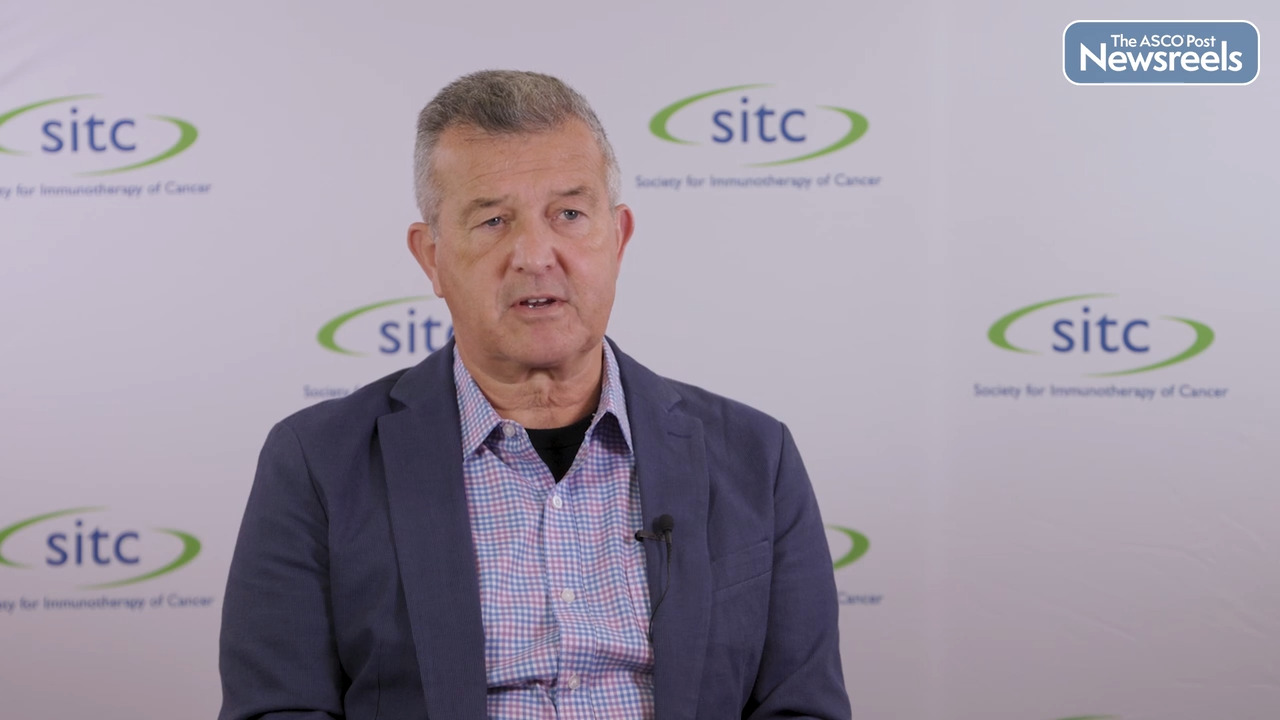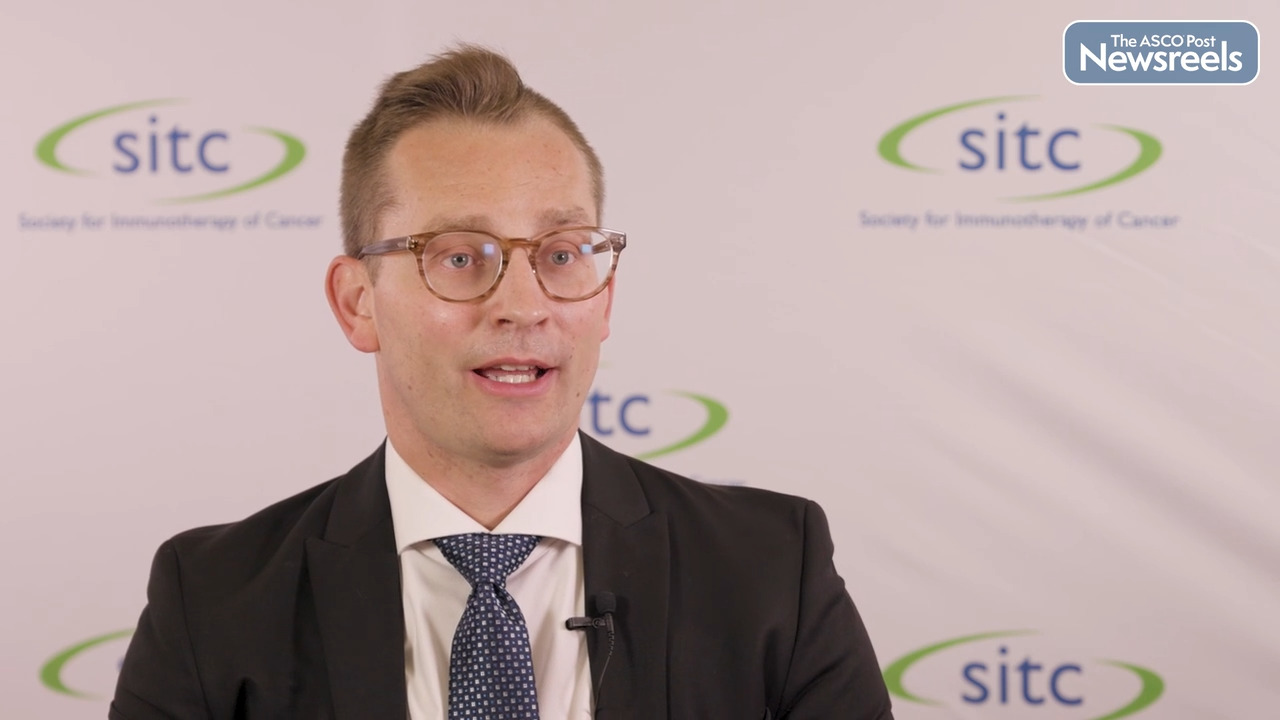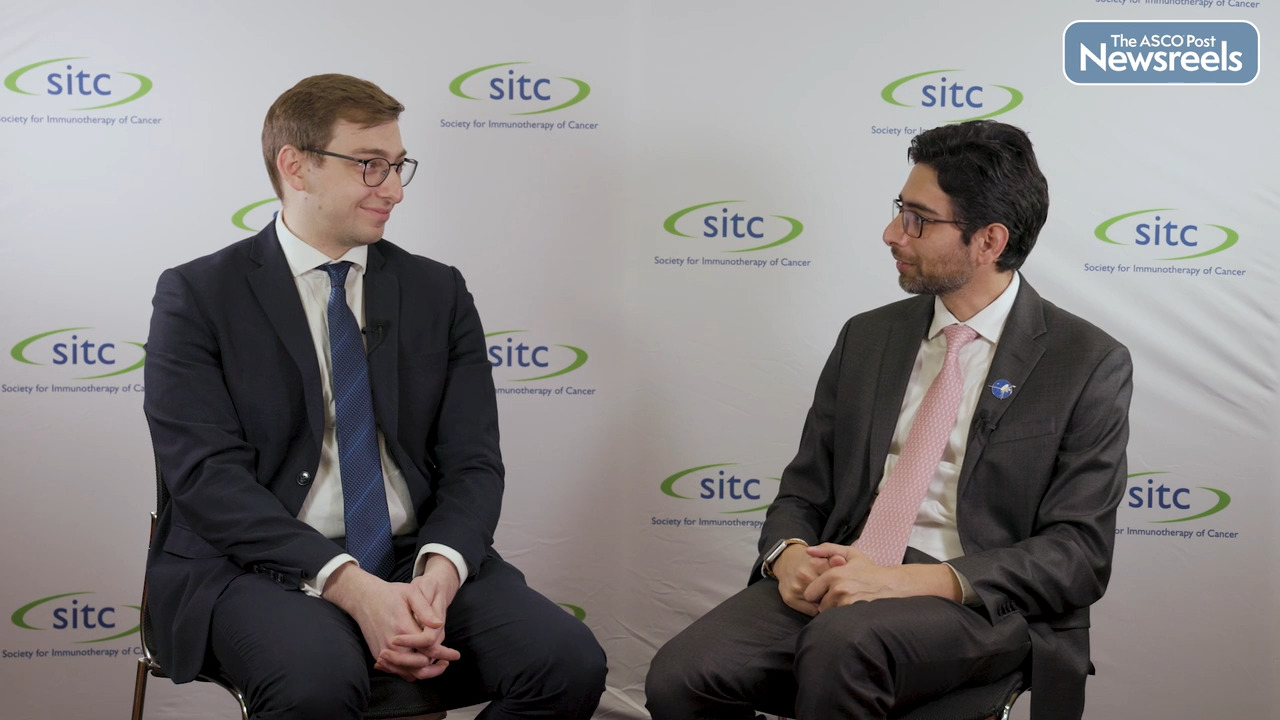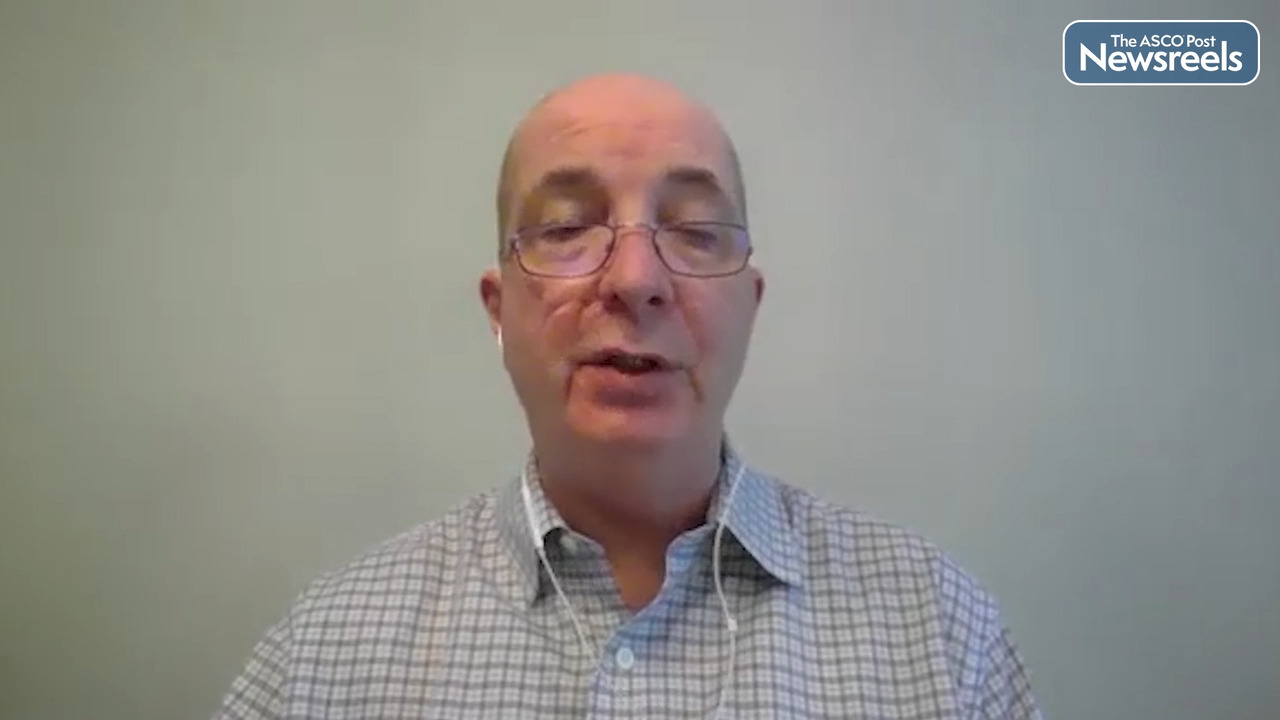ELIANA Trial 3-Year Update: Tisagenlecleucel in Pediatric and Young Adult Patients With Relapsed or Refractory B-Cell ALL
As reported in the Journal of Clinical Oncology by Laetsch et al, the 3-year update of the phase II ELIANA trial showed durable responses and a manageable safety profile with tisagenlecleucel for the treatment of pediatric and young adult patients with relapsed or refractory B-cell acute...
Roger Li, MD, on Bladder Cancer: Boosting Immune Checkpoint Blockade With an Oncolytic Adenovirus
Roger Li, MD, of the H. Lee Moffitt Cancer Center, discusses results from a phase II single-arm study of CG0070, a cancer-selective oncolytic adenovirus that creates mechanistic synergy with immune checkpoint blockade. In this trial, the virus was combined with pembrolizumab in patients with non–muscle-invasive bladder cancer that is unresponsive to bacillus Calmette-Guérin. At 3 months, 88% of the 35 patients enrolled achieved a complete response (Abstract 666).
Michael B. Atkins, MD, on Reconciling Differences in Phase II and III Immuno-oncology Trial Data
Michael B. Atkins, MD, of Georgetown Lombardi Comprehensive Cancer Center, explores recent clinical trials in immuno-oncology in which the phase III trial produced markedly different results from the phase II trial. To help understand the potential value to patients of late-stage trials of treatment combinations, the Society for Immunotherapy of Cancer has developed a checklist for investigators, applicable to any regimen in which immune modulation is an important component of the antitumor effect.
Kishu Ranjan, PhD, on Non–Small Cell Lung Cancer: New Findings on a Biomarker and Immunotherapy Resistance
Kishu Ranjan, PhD, of Yale University School of Medicine, discusses his study findings, which identified a deficiency in the biomarker TAP2 as a prominent immune evasion mechanism in patients whose non–small cell lung cancer has resisted immunotherapy (Abstract 148).
T-DXd in Pretreated Patients With HER2-Low Advanced Gastric or Gastroesophageal Junction Adenocarcinoma
As reported in the Journal of Clinical Oncology by Yamaguchi et al, an exploratory cohort analysis in a Japanese/South Korean phase II trial (DESTINY-Gastric01) indicated that fam-trastuzumab deruxtecan-nxki (TDX-d) showed activity in previously treated—but anti-HER2 treatment–naive—patients with...
Jonathan Chen, MD, PhD, on NSCLC: Predicting Response to Immunotherapy
Jonathan Chen, MD, PhD, of Massachusetts General Hospital, discusses “immunity hubs” that interact with a reservoir of stem-like CD8 T cells and appear to be associated with subsequent response to anti–PD-1 blockade in patients with non–small cell lung cancer. Hybrid hubs, Dr. Chen says, are a favorable class of immunity hub notable for CD8-positive and TCF7-positive cells, as well as CCL19 expression (Abstract 956).
Saman Maleki, PhD, on Melanoma: Reducing Primary Resistance to Immunotherapy
Saman Maleki, PhD, of Canada’s Western University and Lawson Health Research Institute, discusses modifying the gut microbiome in patients with advanced melanoma to induce a response to anti–PD-1 therapy and potentially reduce primary resistance to immunotherapy. A fecal microbiota transplant from healthy donors before treatment appears to be beneficial (Abstract 614).
Julia Tchou, MD, PhD, on Triple-Negative Breast Cancer: Radiation Boost Plus Pembrolizumab
Julia Tchou, MD, PhD, of the University of Pennsylvania, discusses preliminary results of the phase Ib/II BreastVax study, which suggested a single preoperative pembrolizumab dose plus a tumor-targeting radiation boost may result in pathologic response in patients with early-stage triple-negative breast cancer (Abstract 644).
Effect of Baseline Immunosuppression on COVID-19 Severity and Risk of Cytokine Storm in Patients Receiving Immunotherapy for Cancer
In a registry-based retrospective cohort study reported in JAMA Oncology, Ziad Bakouny, MD, and colleagues in the COVID-19 and Cancer Consortium (CCC19 registry) found that patients receiving cancer immunotherapy who had baseline immunosuppression, but not those without baseline immunosuppression,...
Cost-Effectiveness of Polatuzumab Vedotin-piiq Plus R-CHP and CAR T-Cell Therapy vs Standard of Care in DLBCL
In a study reported in the Journal of Clinical Oncology, Vijenthira et al found that front-line polatuzumab vedotin-piiq plus rituximab, cyclophosphamide, doxorubicin, and prednisone (R-CHP), second-line chimeric antigen receptor (CAR) T-cell therapy, or the combination would not be likely to be...
Coadministration of CD19- and CD22-Directed CAR T-Cell Therapy in Pediatric B-Cell ALL
In a Chinese phase II study reported in the Journal of Clinical Oncology, Wang et al found that the coadministration of CD19- and CD22-directed chimeric antigen receptor (CAR) T cells produced promising initial outcomes in pediatric patients with B-cell acute lymphoblastic leukemia (ALL) with...
Comparison of Bevacizumab Durations in Front-Line Therapy for Advanced Ovarian Cancer
In a European phase III trial (AGO-OVAR 17 BOOST/GINECO OV118/ENGOT Ov-15) reported in the Journal of Clinical Oncology, Jacobus Pfisterer, MD, PhD, and colleagues found no significant progression-free survival benefit with the extension of bevacizumab treatment from 15 to 30 months in patients...
CAR T-Cell Therapy Outcomes Similar Across Different Socioeconomic Levels Among Patients With Pediatric ALL
Although socioeconomic status often influences survival outcomes, pediatric patients with relapsed or refractory acute lymphoblastic leukemia (ALL) who were living in poverty and were treated with CAR T-cell therapy achieved similar overall survival and were equally likely to achieve a complete...
POSEIDON Trial: First-Line Durvalumab With or Without Tremelimumab Plus Chemotherapy in Metastatic NSCLC
As reported in the Journal of Clinical Oncology by Melissa L. Johnson, MD, and colleagues, the pivotal phase III POSEIDON trial has shown significantly improved progression-free and overall survival with the addition of tremelimumab and durvalumab to platinum-based chemotherapy in the first-line...
Margetuximab-cmkb vs Trastuzumab With Chemotherapy in Previously Treated Advanced HER2-Positive Breast Cancer: Final Overall Survival Analysis of the SOPHIA Trial
As reported in the Journal of Clinical Oncology by Hope S. Rugo, MD, FASCO, and colleagues, the final overall survival results of the pivotal phase III SOPHIA trial have shown no significant difference between margetuximab-cmkb plus chemotherapy vs trastuzumab plus chemotherapy in previously...
Antoni Ribas, MD, PhD, on Solid Tumors: Safety and Efficacy of TCR T-Cell Therapy
Antoni Ribas, MD, PhD, of the University of California, Los Angeles, discusses a phase I study that used CRISPR gene editing to simultaneously “knock out” endogenous T-cell receptors and replace them with personalized neoantigen T-cell receptors in patients with solid tumors. The edited TCR T-cell products were safely infused and trafficked to the tumor lesions (Abstract 1478).
Michael A. Postow, MD, on Using the Novel Radiotracer Crefmirlimab Berdoxam for Imaging to Assess Immunotherapy Responsiveness
Michael A. Postow, MD, of Memorial Sloan Kettering Cancer Center, discusses new findings on the correlation between CD8 cell PET imaging with zirconium-89–crefmirlimab berdoxam and CD8 cell immunohistochemistry in patients with advanced cancer receiving immunotherapy. Noninvasive CD8 PET scanning with crefmirlimab berdoxam permits whole-patient, longitudinal CD8 assessment, which is currently under investigation as a biomarker for immunotherapy responsiveness and may be a useful tool for immunotherapy development and clinical management (Abstract 1472).
David Reardon, MD, on Glioblastoma: A Microbiome-Based Vaccine, Nivolumab, and Bevacizumab
David Reardon, MD, of Dana-Farber Cancer Institute, discusses phase I/II results from the EOGBM1-18/ROSALIE study, which showed the EO2401 vaccine plus nivolumab generated systemic immune responses correlating with efficacy in patients with recurrent glioblastoma. Adding bevacizumab to this combination appeared to improve efficacy. (Abstract 642).
Wade T. Iams, MD, on NSCLC: Combining an Antigen-Presenting Cell Activator With Pembrolizumab
Wade T. Iams, MD, of Vanderbilt University Medical Center, discusses phase II efficacy results from the first-line non–small cell lung cancer cohort of the TACTI-002 study. The results suggest that when combined with pembrolizumab, eftilagimod alpha yielded encouraging efficacy across all PD-L1 levels, including patients with PD-L1 low and PD-L1 negative disease (Abstract 1470).
Talal El Zarif, MD, and Abdul Rafeh Naqash, MD: For Patients Living With HIV and Cancer, New Data on Immune Checkpoint Inhibitors
Talal El Zarif, MD, of Dana-Farber Cancer Institute, and Abdul Rafeh Naqash, MD, of Stephenson Cancer Center at The University of Oklahoma, discuss the results of their cohort study of patients living with HIV and metastatic non–small cell lung cancer, who are often underrepresented in clinical trials, and the safety and efficacy of treating this unique population with immune checkpoint inhibitors (ICIs). The data showed that patients living with HIV and lung cancer had similar toxicity profiles and clinical outcomes as did those who did not have HIV and received ICIs (Abstract 437).
New Phase I/II Data on the CD40 Antibody Sotigalimab in Combination With Pembrolizumab in Patients With Metastatic Melanoma
New data from an ongoing phase II trial evaluating first-line intratumoral administration of sotigalimab, a CD40 agonist antibody, in combination with systemic pembrolizumab, an anti–PD-1 antibody, in metastatic melanoma was presented by Bentebibel et al at the Society for Immunotherapy of Cancer...
Management of Severe Immune-Related Adverse Events With Ipilimumab/Nivolumab and Survival in Advanced Melanoma
In a Dutch study reported in JAMA Oncology, van Not et al found that management of grade ≥ 3 immune-related adverse events with steroids alone vs steroids plus second-line immunosuppressants was associated with better survival outcomes among patients receiving first-line combination ipilimumab and...
First-Line Pembrolizumab vs Chemotherapy in Advanced PD-L1–Positive NSCLC Without EGFR/ALK Alterations
As reported in the Journal of Clinical Oncology by Gilberto de Castro, Jr, MD, PhD, and colleagues, 5-year follow-up of the KEYNOTE-042 trial showed a maintained overall survival benefit with first-line pembrolizumab vs chemotherapy in patients with non–small cell lung cancer (NSCLC) with a PD-L1...
Immune Checkpoint Inhibitors for Patients Living With HIV: Safe and Effective in Metastatic NSCLC
Immune checkpoint inhibitors are safe and effective for people living with HIV who have metastatic non–small cell lung cancer (NSCLC), according to data presented by El Zarif et al at the Society for Immunotherapy of Cancer (SITC) 2022 Annual Meeting (Abstract 437). Findings from the first matched...
Potential Treatment Options for Patients With Relapsed Multiple Myeloma Following CAR T-Cell Therapy
Researchers have identified potential therapies to treat patients with multiple myeloma whose cancer has relapsed following chimeric antigen receptor (CAR) T-cell therapy, according to a novel study published by Van Oekelen et al in Blood. CAR T-cell therapy has been a revolutionary treatment for...
Hormone Therapy May Lower Risk of Immune Checkpoint Inhibitor–Associated Myocarditis in Female Patients
Researchers may have discovered the underlying cause of sex differences in immune checkpoint inhibitor–associated myocarditis after immune checkpoint inhibitor treatment, according to a novel study published by Zhang et al in Science Translational Medicine. Their findings pointed to possible...
FDA Approves Tremelimumab in Combination With Durvalumab and Platinum-Based Chemotherapy for Metastatic NSCLC
On November 10, the U.S. Food and Drug Administration (FDA) approved tremelimumab (Imjudo) in combination with durvalumab (Imfinzi) and platinum-based chemotherapy for adult patients with metastatic non–small cell lung cancer (NSCLC) with no EGFR mutations or ALK genomic tumor aberrations. ...
FDA Approves Brentuximab Vedotin in Combination With Chemotherapy for Pediatric Patients With Classical Hodgkin Lymphoma
On November 10, the U.S. Food and Drug Administration (FDA) approved the CD30-directed antibody-drug conjugate brentuximab vedotin (Adcetris) in combination with doxorubicin, vincristine, etoposide, prednisone, and cyclophosphamide for pediatric patients aged 2 years and older with previously...
Expert Point of View: Robin Kate Kelley, MD
Robin Kate Kelley, MD, Professor of Clinical Medicine at the University of California, San Francisco, was invited to discuss the results of LEAP-002.1 She said the main takeaway is that lenvatinib monotherapy is active as a preferred first-line agent for fit patients who have contraindications to...
Lenvatinib Plus Pembrolizumab in Hepatocellular Carcinoma: LEAP-002 Fails to Meet Co-primary Endpoints
The highly anticipated final analysis of the phase III LEAP-002 trial failed to meet expectations, as first-line treatment with lenvatinib plus pembrolizumab did not significantly improve outcomes in unresectable advanced hepatocellular carcinoma. Both progression-free survival and overall survival ...
Expert Point of View: Glenn J. Hanna, MD, and Sherene Loi, MD, PhD
The ASCO Post asked for comment from Glenn J. Hanna, MD, Director of the Center for Salivary and Rare Head and Neck Cancers, Dana-Farber Cancer Institute, and Assistant Professor of Medicine at Harvard Medical School. Dr. Hanna said it is important to put the findings of KEYNOTE-4121 into context...
KEYNOTE-412: Pembrolizumab Plus Chemoradiation Falls Short in Locally Advanced Head and Neck Cancer
Pembrolizumab plus chemoradiation failed to demonstrate a statistically significant improvement in event-free survival vs chemoradiation alone in patients with locally advanced head and neck squamous cell carcinoma, but favorable numerical trends were demonstrated, according to results of the phase ...
Expert Point of View: Shom Goel, MBBS, PhD
The invited discussant of the post hoc analysis of TROPiCS-02 was Shom Goel, MBBS, PhD, Laboratory Group Leader at the University of Melbourne and a consultant oncologist at the Peter MacCallum Cancer Centre in Australia. Dr. Goel noted there remains much to learn about the HER2-low subset of...
TROPiCS-02: Efficacy of Sacituzumab Govitecan Within HER2-Negative Subsets of Breast Cancer
In a post hoc analysis of the phase III TROPiCS-02 trial, sacituzumab govitecan-hziy improved efficacy outcomes in HER2-negative immunohistochemistry (IHC) subgroups.1 Results were consistent with those of the intent-to-treat population of hormone receptor–positive/HER2-negative advanced breast...
POSEIDON Follow-up Suggests Chemoimmunotherapy Triplet Extends Survival in Difficult-to-Treat NSCLC Mutational Subtypes
After 4 years, a limited course of five cycles of tremelimumab added to durvalumab plus chemotherapy extended overall survival in patients with metastatic non–small cell lung cancer (NSCLC) compared with chemotherapy alone, according to an updated exploratory analysis of the phase III POSEIDON...
Expert Point of View: Ignacio Melero, MD, PhD
Ignacio Melero, MD, PhD, Professor of Immunology and Co-Director of the Department of Immunology and Immunotherapy at the Clinica Universidad de Navarra in Spain, was the invited discussant of the M14TIL study. He noted that a 50% relative reduction in the risk of disease progression is impressive...
Prolonging Remission in Anti–PD-1 Refractory Melanoma With Tumor-Infiltrating Lymphocyte Therapy
For the first time in a multicenter randomized trial, T-cell therapy has been shown to improve outcomes in a solid tumor. In the phase III M14TIL trial, first-line or second-line treatment with tumor-infiltrating lymphocytes (TIL) led to a 50% reduction in disease progression or death from advanced ...
ECHELON-1 Shows Benefit for First-Line Brentuximab Vedotin Plus AVD in Advanced Hodgkin Lymphoma
The results of ECHELON-1 were presented by David J. Straus, MD, of Memorial Sloan Kettering Cancer Center, New York, at the 2022 National Comprehensive Cancer Network (NCCN) Annual Congress: Hematologic Malignancies. Dr. Straus said: “It is a great honor and privilege to present updated results...
High-Dose Chemotherapy and Stem Cell Transplant vs CAR T-Cell Therapy for Resistant DLBCL
Which is the preferred second-line treatment option for patients with relapsed or refractory diffuse large B-cell lymphoma (DLBCL): high-dose chemotherapy and autologous stem cell transplantation (ASCT) or chimeric antigen receptor (CAR) T-cell therapy? This was the subject of a debate at the...
Addition of Brentuximab Vedotin to Chemotherapy in Pediatric High-Risk Hodgkin Lymphoma
As reported in The New England Journal of Medicine by Castellino et al, the phase III Children’s Oncology Group (COG) AHOD1331 trial showed improved event-free survival with brentuximab vedotin plus chemotherapy vs standard chemotherapy in previously untreated pediatric patients with high-risk...
FDA Approves Cemiplimab-rwlc in Combination With Platinum-Based Chemotherapy for NSCLC
On November 8, the U.S. Food and Drug Administration (FDA) approved the PD-1 inhibitor cemiplimab-rwlc (Libtayo) in combination with platinum-based chemotherapy for adult patients with advanced non–small cell lung cancer (NSCLC) with no EGFR, ALK, or ROS1 aberrations. Study 16113 Efficacy was...
Indian Trial Explores Addition of Low-Dose Nivolumab to Chemotherapy in Advanced Head and Neck Cancer
In an Indian single-center phase III trial reported in the Journal of Clinical Oncology, Vijay Patil, MBBS, MD, DM, and colleagues found that the addition of low-dose nivolumab to triple metronomic chemotherapy significantly improved overall survival in patients with newly diagnosed or recurrent...
Jonathan E. Rosenberg, MD, on Urothelial Cancer: Results From EV-103, Cohort K on Enfortumab Vedotin and Pembrolizumab
Jonathan E. Rosenberg, MD, of Memorial Sloan Kettering Cancer Center, discusses recent findings on the safety and antitumor activity of enfortumab vedotin-ejfv given intravenously as monotherapy or in combination with pembrolizumab to previously untreated cisplatin-ineligible patients with locally advanced or metastatic urothelial cancer (Abstract LBA73).
Robert J. Motzer, MD, on Renal Cell Carcinoma: New Results With Nivolumab and Ipilimumab
Robert J. Motzer, MD, of Memorial Sloan Kettering Cancer Center, discusses phase III results of the CheckMate 914 trial, which explored the efficacy of adjuvant nivolumab plus ipilimumab vs placebo in the treatment of patients with localized renal cell carcinoma who are at high risk of relapse after nephrectomy (Abstract LBA4).
Ciltacabtagene Autoleucel in Relapsed or Refractory Multiple Myeloma
In a Chinese phase II trial (CARTIFAN-1) reported in the Journal of Clinical Oncology, Mi et al found that the anti–B-cell maturation antigen chimeric antigen receptor (CAR) T-cell therapy ciltacabtagene autoleucel was active in patients with relapsed or refractory multiple myeloma. Study Details...
Expert Point of View: Alexander M.M. Eggermont, MD; Omid Hamid, MD; and James Larkin, PhD
The results of SWOG S18011 were met with enthusiasm by attendees at the Presidential Symposium of the European Society for Medical Oncology (ESMO) Congress 2022. The ASCO Post captured the thoughts of several melanoma experts, who had somewhat different ideas about the immediate clinical...
SWOG S1801: Addition of Neoadjuvant Pembrolizumab to Adjuvant Pembrolizumab Yields Benefits in High-Risk Resectable Melanoma
In resectable stage III to IV melanoma, three cycles of neoadjuvant pembrolizumab followed by adjuvant pembrolizumab was significantly more beneficial than adjuvant pembrolizumab alone, based on the results of the phase II SWOG S1801 trial presented in a Presidential Symposium at the European...
COSMIC-313: Triplet Therapy Is Active in Renal Cell Carcinoma, but Toxicities Pose a Challenge
The addition of cabozantinib to nivolumab plus ipilimumab prolonged progression-free survival in untreated intermediate-risk patients with advanced renal cell carcinoma (RCC), according to the first results of the phase III COSMIC-313 trial. These findings were presented as a Presidential Symposium ...
Researchers Discover Differences in Response to Pembrolizumab Among Patients With Endometrial Cancer
Researchers discovered a differential clinical response to pembrolizumab in patients with Lynch-like (mutated) vs methylated microsatellite instability–high endometrial cancer, outlining characteristics of patients who may derive benefit from immune checkpoint blockade antibodies, according to new...
Neoadjuvant Immunotherapy With Relatlimab and Nivolumab in Stage III Melanoma
The combination of immune checkpoint inhibitors relatlimab and nivolumab for patients with stage III melanoma given before surgery was safe and completely cleared all viable tumor in 57% of patients in a phase II study, according to findings published by Amaria et al in Nature. In addition to...
